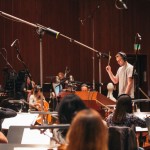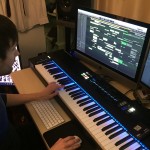Yes, hip hop. The last time we talked to composer Bear McCreary it was all about Dark Void and Dark Void Zero. With new projects on the horizon, we thought it’d be a good time to catch up on his latest projects, and we were right. Along with his upcoming videogame score for SOCOM 4, McCreary also touches on his feature film debut with Step Up 3D as well as Dark Void and Dark Void Zero. He also hints at some big gaming announcements that will come in the near future, and will be of particular interest to hardcore game music fans.
He’s got me excited, and the instrumentation used in SOCOM 4 definitely has me more excited about the game than I have been up to this point. Hit the jump for our Comic Con interview and see why you should be excited about the SOCOM 4 soundtrack as well.
OSV: We’re here with Bear McCreary at Comic Con. We talked to you here last year when the big thing was Dark Void. It’s been a big year for you, as we saw the release of Dark Void at the beginning of the year, the announcement that you’re working on SOCOM 4, and you’re working on all kinds of projects in television and film. So would you like to catch us up on the world of Bear McCreary, at least in terms of what you’re able to talk about?
McCreary: Well, there’s a lot of stuff I can’t tell you about, but as you mentioned, Dark Void and Dark Void Zero came out. SOCOM 4 is up next. I was working on that for about 2 years and I’m finally done, so that’s going to be really exciting. My feature film debut is in a couple weeks. I did Step Up 3D for Touchstone. So finally, everyone’s been asking me, “When are you going to do a hip-hop dance movie?”
OSV: [Laughs] That’s what I’ve been asking.
McCreary: Exactly! Finally, the wait is over. The Bear McCreary hip-hop dance movie is out. No, it’s going to be a lot of fun and I’m excited about it. For TV shows, I’m doing Caprica, Eureka, and a new show called The Cape that is a superhero drama premiering on NBC, and I’m doing a panel for that later today. I think that’s everything I can safely say. There are other videogames in the works, some games that all of your readers and fans will be excited about. So thankfully SOCOM and Dark Void are not my only excursions into games.
OSV: I guess that means we’ll see you in Rockman 11, right? [Laughs]
McCreary: Oh, that’d be nice!
OSV: So it sounds like you’ve been incredibly busy even with projects you can’t talk about. You said you’ve been working on SOCOM 4 for 2 years, so where does that put it in the timeline in regards to Dark Void?
McCreary: I actually started working on them simultaneously. In fact, I was hired on them both around the same time. Dark Void was first, and in fact, the time that it took to discuss SOCOM and talk about the themes, meet with the developers, and go through a foundation-laying process, in that same time, we did all of that on Dark Void and finished the game. What happened though is that I was hired onto SOCOM early in the development process, so it took longer. There is also a lot more music. With Dark Void I delivered about 3 hours of original, totally distinct music that was able to be reconfigured into between 7 to 10 hours of music. SOCOM is nearly twice that where just the sheer original music is closer to 6 hours, and it will end up being around 15 to possibly 20 hours of unique arrangements and variations, so it just took a long time to generate and write all that music.
In terms of the differences between the two games, it was interesting because Dark Void was limited in the bottleneck of having to come out on the Xbox 360. So there were technical limitations. I actually wrote music for Dark Void that didn’t even fit on the disc.
OSV: Wow.
McCreary: And I understand that there just isn’t the budget and time to make a PlayStation version that has different music than the Xbox version, so whatever fit on the Xbox 360 version is what ended up in the game. With SOCOM, it’s a completely different story. We have much more storage space and a much more powerful processor, we were able to create music that was a lot more sophisticated on a technical level. For that reason, it was also an extra challenge because I had to deal with the technical side of it as well and make sure I was delivering the best product possible.
OSV: So I guess we’re going to see a 10-disc box set for the SOCOM 4 soundtrack?
McCreary: Actually, it’s funny that you mention that. I’m working on the soundtrack right now, and I don’t know what to do. Of that 6 hours or so, it’s really ambient. It’s beautiful videogame music, but I actually think it’d make for a boring soundtrack with all of it in there. So I’m trying to whittle it down to maybe 2 discs, and if not 2, then 1. But I think it will be a great soundtrack.
OSV: That’s actually a big debate we have on the site constantly. In terms of the soundtrack, obviously in the context of the game, it’s supposed to enhance what’s going, and if it sticks out, then it might not be the best soundtrack. Unless it’s the hyper-melodic stuff we heard from Japan back in the day, that we all know and love. So there’s that big debate. Should that soundtrack album that’s sold separately be enjoyable in the nostalgic factor it has with the game, or should it be enjoyable as standalone product given that it’s being sold as a standalone product?
McCreary: Well, my philosophy is that the soundtrack is always a standalone musical experience. If you look at the soundtracks I did for Dark Void, Battlestar Galactica, Terminator, and the forthcoming Human Target soundtrack, it really is an album listening experience. If a cue wasn’t interesting on its own, or wasn’t worth listening to on its own, I didn’t put it on there. So SOCOM will be a challenge. It won’t be a challenge in that there is at least one disc of kick ass action cues, cinematics, and character themes. There’s a lot of symphonic stuff, but there are hours and hours of really cool stealth music. It’s a stealth game. So we’ll see. We’ll have to see what people’s interests are and what I decide when I’m working on the album.
OSV: Right, with the Dark Void soundtrack, you’re saying there was about 3 hours of music, but the album is just one disc, but it really tells the story of the game through the album.
McCreary: Absolutely. I wouldn’t release a multi-disc Dark Void even if I had the opportunity because I feel that that album really tells a great story and is such an enjoyable listen. And there were some great pieces that didn’t make the cut, but you can hear them in the game, so gamers get to hear them either way.
OSV: In Dark Void, there were emotional cues, but also a lot of jungle action music with rhythmic percussion and the like. So what can we expect from SOCOM 4 given that it focuses on a more hardcore US military setting?
McCreary: Interesting that you would ask. That’s the first thing I asked when they called me to do the game. I basically said, “I’m not the right guy to do this.”
You’re not going to hear any of that patriotic fanfare. The music in the game is commenting on the emotional story and the character arc, which is to that imply that this game has an emotional story and a character arc. It’s really different. And I’m a fan of previous SOCOM games–I’ve played them all–but I feel that the emphasis was on the gameplay, and the cinematics were there to give you a reason to run through the environments. They look truly cinematic, the writing is good, the acting is good, and the score is a real score. It’s a real cinematic score.
In terms of the instrumentation, it’s almost entirely Asian. The game takes place in Southeast Asia, so the score is taking you to this exotic place. So where I feel the scores to previous SOCOM games were saying, “We’re going to all these exotic locations, but we are the American force,” so the music is reminding you that you’re the Americans going to these others places, the music in SOCOM 4 is telling you, “Hey, you’re in foreign territory, buddy, so be careful.” You are in somebody else’s land, and the main enemies are these guerilla fighters. They’re not a highly organized military, so in so many ways, it’s contemporary with military action in the world today. So I think fans of this kind of game and fans of my music will be excited, and SOCOM fans will be thrilled too because there is still a big kick ass fanfare theme, and you hear it in certain moments. Generally it has more of an emotional, dark quality instead of just a rah, rah, rah fanfare, but it’s there. So there is an orchestral presence that reminds you of past SOCOM games, but it’s in a different language and different context.
OSV: On the topic of ethnic instrumentation and the orchestra, did you get to record live orchestra or players playing these exotic instruments?
McCreary: I have live players on everything I do. If there’s no budget to do live musicians, I probably won’t take on the game unless they ask for a totally 8-bit score in which case I’d jump at the opportunity. If anyone out there wants an 8-bit score, call me. No, but really, we had a tremendous music budget. Sony really got behind us. All of the featured musicians from Battlestar Galactica… yes, well, all of them except the bagpipe player, I didn’t have room for him.
OSV: [Laughs]
McCreary: Everybody else is on this score. All the Asian instruments that you hear in Battlestar Galactica are here. I was also thrilled to work with a gamelan ensemble. Not a sample library, the real thing.
OSV: Wow, that’s really cool.
McCreary: We brought a gamelan into the Warner Bros. scoring stage for four to five days and recorded them, and that’s a huge component of the score. The gamelan is used in ways that I don’t think have ever been done before. The gamelan generally creates these very dreamy and beautiful textures, but we used it in action cues. It’s a violent sound when played that way. And then yes, we also recorded a week of full orchestra up in San Francisco, so everything you’re hearing is live. Everything you’re hearing is authentic. The orchestral sounds are orchestral, and the Asian sounds are live, and the gamelan is real.
OSV: I really can’t wait to hear this.
McCreary: Yeah, it’s awesome. It’s a really exciting score.
OSV: At the time you started working on the game, was it a PlayStation Move compatible title, or was that even talked about, and did that change anything when you were working on the game?
McCreary: When I first started working on it, it wasn’t. I didn’t find out about that until very late in the game. It didn’t change anything for me, but as a gamer, I’m really excited to play it. I want to see how it works.
OSV: Well, we’ll be looking forward to it as well. Is there anything else you’d like to tell us? I did want to ask about Step Up 3D real quick. Was it a typical movie production cycle where you only had a few weeks to write this hip-hop score?
McCreary: I had a couple of weeks, but compared to television it was like a vacation. In TV, I’m used to a couple of days. It was still tense and a lot of work, and the pressure was on because it was my first studio theatrical film, but it was great. I had worked with the director in college, so we go back a long time and already had a working relationship. Everybody at Disney was really supportive, and the musicians—who played for me every week on Human Target—were great.
The only other thing I want to mention is that for the Human Target soundtrack CD, we finally got a deal worked out with Warner Bros. where iTunes will have the equivalent of a double-disc set, and La-La Land Records will be putting out a 3-disc physical release. It’s uncompressed audio, there are bonus tracks, and extra interviews with me and the show runner with some very blunt conversations about the music-making process. I think soundtrack fans and fans of good action music are going to enjoy this. We’re looking at releasing it in October.
OSV: Great, we’ll be looking forward to that as well. Now, this is my last question, and I have to apologize in advance for putting you on the spot. Several years ago at the Composer Expo 2006, you were on a panel with Mark Mothersbaugh and others, and at the end of the panel, I stood up and asked you a question. I asked, “Bear, you’ve said you’re a huge gamer, so would you consider scoring games?”
McCreary: [Laughs] Oh yeah! What did I say?
OSV: You said, “I’ll work on any project as long as the money is there.”
McCreary: [Laughs]
OSV: Well, I think it’s obvious that you have a passion for videogames, so I know it couldn’t have been just money that brought you into the industry.
McCreary: Well, in fact, I think what I meant was that I’ll write for anything as long as it pays the bills, you know? But really, games are something I’ve always been passionate about. I think it’s one of those cosmic coincidences that Capcom called me. I’ve always adored Capcom games, and the fact that I got to score Dark Void and the even create an 8-bit soundtrack for Dark Void Zero… it may sound somewhat vague, but I think it was just meant to be. It’s a lot of fun. love playing games, and being able to contribute to a couple is just really exciting. I am fairly confident that I have more coming up, and certain that one of those will be of great interest to you guys. That’s unfortunately all I can say about it right now.
OSV: I do want to say that fans recognize your passion for games. I think fans appreciate and are excited about announcements regarding your work. So please keep up the great work, and we’re looking forward to hearing your music in SOCOM 4, some of these unannounced projects, and in Step Up 3D in a couple weeks.
McCreary: Cool!
OSV: Thank you for your time. Have a great time at Comic Con!
McCreary: You too. Thanks!
__
Visit Bear McCreary’s official blog for updates and new announcements regarding his upcoming projects and album releases.










































[…] Source: http://www.originalsoundversion.com/?p=10972 […]
[…] did a few other interviews while I was there. Original Sound Version, who I always enjoy talking with, asked me about Step Up 3D and my work on the upcoming Sony […]